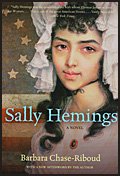|
Sally Hemingsby Barbara Chase-RiboudReviewed by Margaret Donsbach Though Sally Hemings resents the man's confident air, "coming up her road, as if God had ordained it and as if he owned the road," on impulse she invites him in. His questions awaken memories. She enjoys their talk enough to welcome him back another day. Over the summer she discovers: "She had lived a life; she was startled to perceive that life." Published almost twenty years before DNA tests confirmed that at least one son of Sally Hemings was descended from a male of Thomas Jefferson's family, most probably Jefferson himself, Chase-Riboud's novel tells the story of a lonely Jefferson morally opposed to slavery and a beautiful young woman, his dead wife's slave. After accompanying his daughter to France in 1787 where he is serving as a diplomat and slavery is not recognized, Sally Hemings becomes his lover. It is a delicate novel, wise and moving, its portraits full of subtle shadings that bring the characters to life with all the ambiguous longings, revelatory silences and conflicted passions of real human beings. The story of a slave who at age fifteen falls in love with her master could easily slip into soap opera. Chase-Riboud makes it instead a meditation on love and the imbalances of power that can, for any man or woman, blight love and make it a slavery of the heart. Her quiet, perceptive, adaptable heroine very quietly develops a courage and self-respect that makes her love transcendent, bringing her to stand triumphant "in the vast intractable wilderness of the American landscape ... where all biographies become one." (1979; the new 2009 edition from Chicago Review Press includes a list of source documents and an extensive Afterword discussing the story behind the author's research and the Sally Hemings controversy) More about Sally Hemings at Powell's Books or Amazon.com Interview with author Barbara Chase-Riboud
The President's Daughter by Barbara Chase-Riboud (1994), a sequel to Sally Hemings about her daughter Harriet, who leaves Monticello to pass as white. More info Jacob’s Ladder: A Story of Virginia During the War by Donald McCaig (1998), a literary novel about a young man and a light-skinned slave girl who have an affair and are forced to separate when the Civil War breaks out. More info The Foxes of Harrow by Frank Yerby (1946), about a New Orleans plantation owner in the early nineteenth century who has a child by his black mistress as well as one by his wife and one by his wife's sister.
Thomas Jefferson: An Intimate History by Fawn Brodie (1974), the controversial Jefferson biography that, two decades before the DNA evidence emerged, presented the case for Sally Hemings's children being fathered by Jefferson. More info Sally Hemings and Thomas Jefferson: History, Memory and Civic Culture edited by Jan Lewis (1999), a variety of distinguished historians discuss the evidence that Sally Hemings was Thomas Jefferson's mistress and its implications for American history and culture. More info In Defense of Thomas Jefferson: The Sally Hemings Sex Scandal by William Hyland (2009), makes the argument that Thomas Jefferson was not the father of Sally Hemings's children. More info
Jefferson in Paris Sally Hemings: An American Love Story, a 2000 made-for-television movie starring Carmen Ejogo as Sally Hemings and Sam Neill as Thomas Jefferson.
A brief biography of Sally Hemings at the Jefferson Monticello website with a link to a discussion of factual evidence relating to the question of what her relationship was to Thomas Jefferson. Back to Novels of the Eighteenth Century
|
